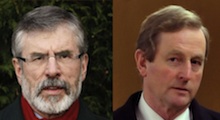
In the absence of a televised leaders’ debate, voters in the 26 Counties will get an opportunity to make up their mind on the austerity referendum this weekend when Sinn Fein leader Gerry Adams and Taoiseach Enda Kenny make competing, but separate, television addresses.
Kenny has refused to debate Mr Adams for several weeks now, but has finally decided this week to address voters in a “State of the State” broadcast.
If passed, the European Union’s fiscal compact will place a constitutional requirement on the Dublin government to adhere to strict budget rules. The treaty requires a maximum 3% budget deficit in the annual finances of each of the signatory states from 2014.
The feasibility of that target remains a matter of debate, but unprecedented tax hikes and public service cuts will need to be introduced in order to balance the 26-County budget within the required timeframe.
If approved by voters on Thursday, the draconian budget rules will carry the weight of constitutional law, and will continue to apply to every future Dublin government.
However, sharply conflicting signals have emerged from the French and German governments over their attitude to the treaty and the entire austerity project. A summit of EU leaders in Brussels this week failed to achieve agreement on changes which might facilitate economic growth policies in the signatory states.
Discussions are due to resume next month, by which time the outcome of the 26 County vote next Thursday will be known. Even supporters of the treaty have warned that it is too soon to pass the referendum.
The Taoiseach took part in the summit, where he also advocated changes to the treaty to encourage economic growth. However, he has placed the emphasis on carrying the referendum in Ireland as a means of “bringing certainty” to the austerity process.
Polls in Ireland have pointed to indecision and doubts over what the public is voting for, although the ‘Yes’ side retains a clear lead among decided voters.
Despite the uncertainty, Kenny has refused to debate Mr Adams for several weeks now, instead turning to state television for an opportunity to address voters.
The Fine Gael leader was invited by the national broadcaster to do an interview in their words to ‘counterbalance’ Mr Adams’s address to the Sinn Fein Ard Fheis [annual conference] on Saturday night. Both leaders will now make a televised public address, but in very different formats. Mr Kenny will address the nation from RTE studios on Sunday.
Mr Adams said it was “bizarre” that the Taoiseach was to be allocated time on television proportionate to what he says on the austerity treaty in his Ard Fheis address. Raising the matter in the Dail, Mr Adams asked: “Wouldn’t it be more leaderly for the Taoiseach to come into a studio and inform people and have a genuine debate?”
Fianna Fail leader Micheal Martin also said that the fairest way to resolve any issues of lack of media balance in the fiscal treaty referendum campaign is to have a leaders’ debate.
Mr Martin said it was even more important that “we should have confidence in our position to go out there and debate our position”.
Mr Kenny has also ruled out any delay in ratifying the treaty if the referendum on May 31st is passed, and said it would be done as quickly as possible despite the renegotiations.
“The text of the treaty is as is and that’s what’s being voted on by the Irish people. I support the principle, of course, of having a growth agenda additional to what is already in there and we have made that perfectly clear,” Mr Kenny said.
Anti-treaty campaigner Declan Ganley likened the EU negotiations to a game of poker. Posing for photographs outside Government Buildings in Dublin, Mr Ganley held up a book, 52 Great Poker Tips, which he joked was meant as a present for the Taoiseach.
“Enda Kenny wants us to fold our cards on May 31st and hand them over. We need to hold; we need to wait and see their cards first. We need to see what sort of deal France and Germany are going to propose to solve this European crisis,” Mr Ganley said.
Speaking at a press conference on Wednesday, Sinn Fein finance spokesperson Pearse Doherty warned voters “to think very carefully” of the long term legal consequences of their decision.
He said “the harsh fiscal rules and tough enforcement mechanisms in the Austerity Treaty are bad for Ireland and for Europe.
“We are being asked to sign up to an inter-governmental treaty that will place legal obligations on this government and all future governments. These obligations will only be able to change with the consent of all the countries that ratify this Treaty
“We are also being asked to give these harsh rules and tough enforcement mechanisms the protection of our constitution.
“In plain English this means that once ratified it will be almost impossible to extract ourselves from the legal obligations arising from the Austerity Treaty.
“Enshrining the Austerity Treaty and its harsh fiscal rules in international law and giving it the protection of our constitution will make it almost impossible to change in the future.
“While Fine Gael and Labour may be happy with the content of the Treaty they can not speak for future governments. Yet they are asking the voters to tie the hands of future governments and limit future governments’ ability to take the kinds of economic policy decisions that may well be in the best interests of the country.
“This is a bad way to make law. It is a terrible way to make economic policy.”
![[Irish Republican News]](https://republican-news.org/graphics/title_gifs/rn.gif)
![[Irish Republican News]](https://republican-news.org/graphics/title_gifs/harp.gif)

